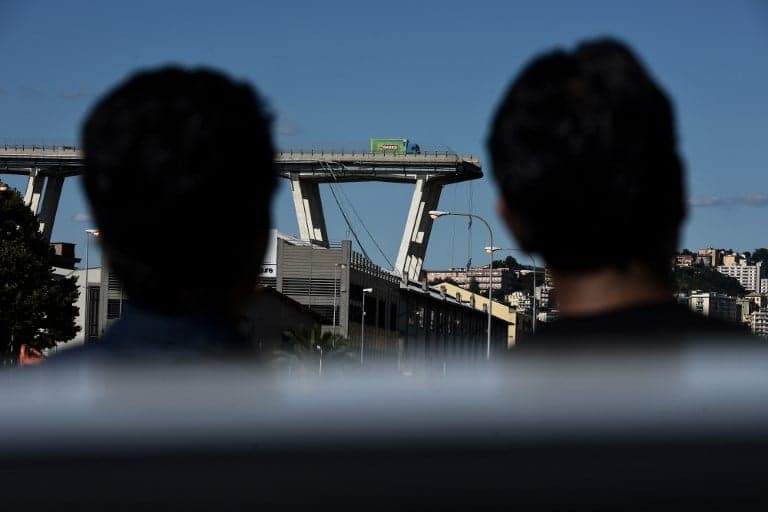Deadly disasters should earn Italy a free pass on budget rules, Rome tells EU

Italy's government said the EU must show flexibility over its big-spending budget because the country had to cope with a series of deadly disasters, including floods and a deadly bridge collapse in Genoa.
According to a copy of a letter sent on Tuesday to Brussels insisting there would be no budget changes, the government said the EU should show "flexibility given exceptional events... [and] exceptional spending."
About 30 people died in storms and floods in Italy early this month, mainly in the northeast.
A total of 43 people were also killed when a decades-old bridge in the port city of Genoa collapsed in August, a disaster that stunned and angered the country and forced authorities to launch a maintenance plan for the road network.
Economy Minister Giovanni Tria told Brussels that over the next three years, making good the damage caused would cost the government about 0.2 percent of gross domestic product (GDP).
READ ALSO: Italy risks EU sanctions by sticking to debt-happy budget
The government earlier defied the European Commission -- which rejected the budget outright last month in a first for the EU -- and said it would not abandon its big-spending plans aimed at getting the stalled economy moving again.
"The budget will not change, neither in its balance sheet nor in its growth forecast. We have the conviction that this is the budget needed for the country to get going again," Italian Deputy Premier Di Maio, who leads the anti-establishment Five Star Movement (M5S), said on Tuesday.
M5S and its coalition partner, the right-wing League party, insist the budget will help kickstart growth in the eurozone's third largest economy and reduce the public debt and deficit.
READ ALSO: Here are the main things included in Italy's 'people's budget'
The Commission had given Italy until Tuesday to make changes to its 2019 plans and warned non-compliance could activate the "excessive deficit procedure" (EDP), a complicated process that could lead to fines and possibly provoke a strong, adverse market reaction.
Italy intends to run a public deficit of 2.4 percent of gross domestic product in 2019 -- three times the target of the government's centre-left predecessor -- and one of 2.1 percent in 2020.
Brussels forecasts Italy's deficit will reach 2.9 percent of GDP in 2019 and hit 3.1 percent in 2020, breaching the EU's 3.0 percent limit.
READ ALSO:
Comments
See Also
According to a copy of a letter sent on Tuesday to Brussels insisting there would be no budget changes, the government said the EU should show "flexibility given exceptional events... [and] exceptional spending."
About 30 people died in storms and floods in Italy early this month, mainly in the northeast.
A total of 43 people were also killed when a decades-old bridge in the port city of Genoa collapsed in August, a disaster that stunned and angered the country and forced authorities to launch a maintenance plan for the road network.
Economy Minister Giovanni Tria told Brussels that over the next three years, making good the damage caused would cost the government about 0.2 percent of gross domestic product (GDP).
READ ALSO: Italy risks EU sanctions by sticking to debt-happy budget
The government earlier defied the European Commission -- which rejected the budget outright last month in a first for the EU -- and said it would not abandon its big-spending plans aimed at getting the stalled economy moving again.
"The budget will not change, neither in its balance sheet nor in its growth forecast. We have the conviction that this is the budget needed for the country to get going again," Italian Deputy Premier Di Maio, who leads the anti-establishment Five Star Movement (M5S), said on Tuesday.
M5S and its coalition partner, the right-wing League party, insist the budget will help kickstart growth in the eurozone's third largest economy and reduce the public debt and deficit.
READ ALSO: Here are the main things included in Italy's 'people's budget'
The Commission had given Italy until Tuesday to make changes to its 2019 plans and warned non-compliance could activate the "excessive deficit procedure" (EDP), a complicated process that could lead to fines and possibly provoke a strong, adverse market reaction.
Italy intends to run a public deficit of 2.4 percent of gross domestic product in 2019 -- three times the target of the government's centre-left predecessor -- and one of 2.1 percent in 2020.
Brussels forecasts Italy's deficit will reach 2.9 percent of GDP in 2019 and hit 3.1 percent in 2020, breaching the EU's 3.0 percent limit.
READ ALSO:
Join the conversation in our comments section below. Share your own views and experience and if you have a question or suggestion for our journalists then email us at [email protected].
Please keep comments civil, constructive and on topic – and make sure to read our terms of use before getting involved.
Please log in here to leave a comment.